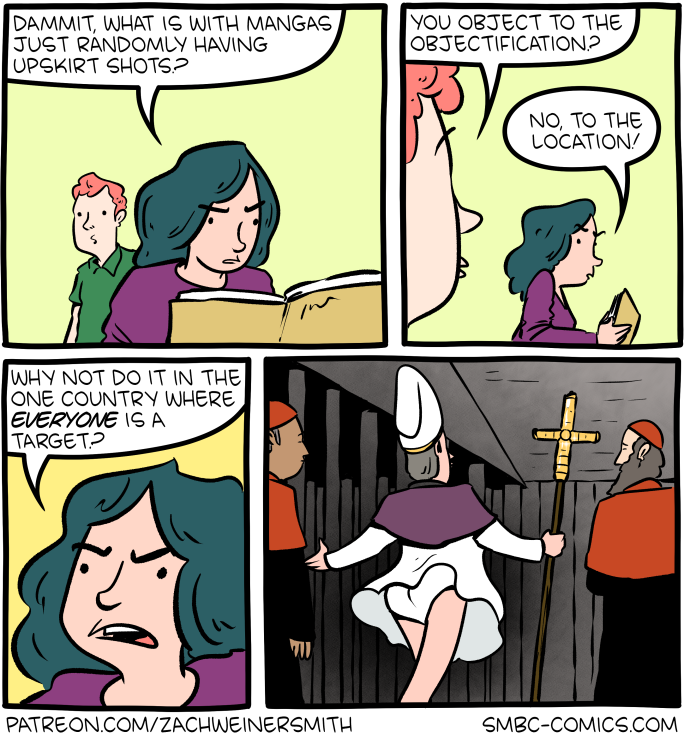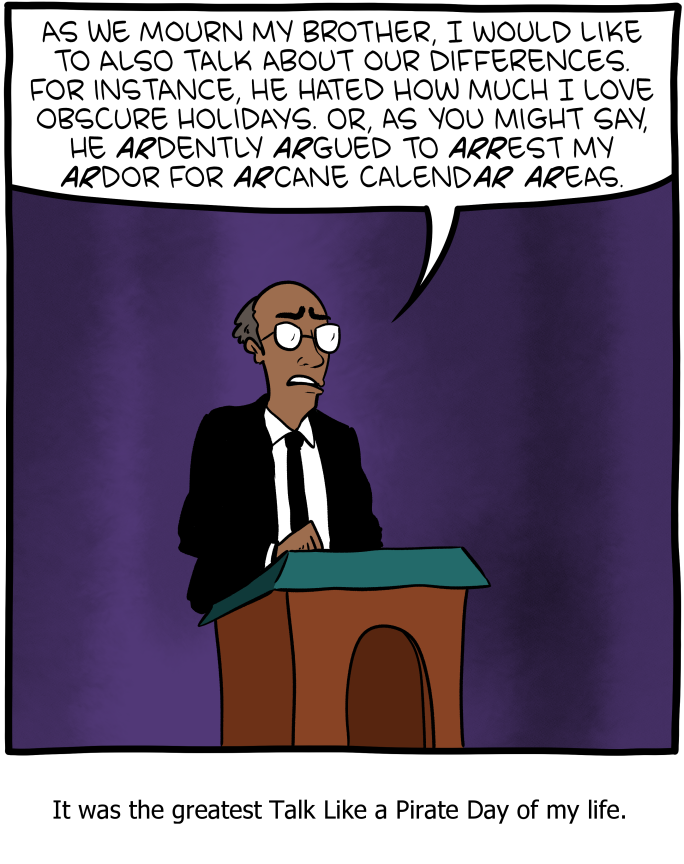Ugh, Discord
Feb. 9th, 2026 09:06 pmDiscord will require a face scan or ID for full access next month
Discord will soon require age verification to access adult content
Just, UGH.
Sidetracks is a collaborative project featuring various essays, videos, reviews, or other Internet content that we want to share. All past and current links for the Sidetracks project can be found in our Sidetracks tag. You can also support Sidetracks and our other work on Patreon.

Hovertext:
Bet you none of these newfangled Ai art generators will do you an upskirt Pope.
Too busy trying to extend their lifespans to, you know, actually Have A Life?
The troubling rise of longevity fixation syndrome: ‘I was crushed by the pressure I put on myself’
One is actually surprised that this guy does in fact go for an evening out in a restaurant with his husband, even if he does exhaustively research it first and pre-order (and then melt down when it comes to him RONG):
He painstakingly monitored what he ate (sometimes only organic, sometimes raw or unprocessed; calories painstakingly counted), his exercise regime (twice a day, seven days a week), and tracked every bodily function from his heart rate to his blood pressure, body fat and sleep “schedule”. He even monitored his glucose levels repeatedly throughout the day. “I was living by those numbers,” he says.
And, indeed, tempted to say, it just feels like living for ever....
With a side of, austere regimes have been followed by religious devotees for centuries but that was for life everlasting in the next, not this, right?
But, honestly, surely it is possible to lead a healthy life which is not actually purgatorial - see also this Why has food become another joyless way to self-optimise?. Thinking back to the delicious healthy nosh at Grayshott of beloved nostalgic memories - along with the lovely treatments etc.
Okay, there are some dietary things I do because I do not particularly have to think about them, but that is because I made certain decisions back when, and e.g. I have my nice tasty home-made muesli of a morning with its healthy oats and linseed and nuts and it is an established pattern but it is a pleasure to eat.

Reading. I have FINISHED Index, A History of the (Dennis Duncan), including both indexes, including The Games Therein, and had a Great time.
Started (just now) The Rose Field, volume three of The Book of Dust (Philip Pullman). ( Grousing; vague spoilers for vol 2 )
so as I say I'm not hugely hopeful for this, but hey, maybe I'm being unfair to it.Writing. Did you know that getting knowledge out of your own head and into other people's is a specific set of skills that has very little to do with how well you know the things you're trying to communicate? TRY TO LOOK SHOCKED, PLEASE. (6.3k words, and am absolutely in an Iterative Cycle of trying to make the introduction more-or-less work. It is progressing, just... very slowly.)
Listening. I realised that Hidden Almanac was possibly in fact exactly a useful sort of thing to listen to while Wrangling Laundry, and have therefore started again from the beginning, at least in part as an attempt to actually listen to some of the episodes I dozed through while they were playing in the car...
Playing. Incomplete White Puzzle progresses. (Today I have added I think three pieces to the contiguous section, two of which I had already joined to each other as a free-foating lump, and made another couple of free-floating lump connections.)
I think we also did a bit more Inkulinati before I got horrendously distracted by Puzzle. And the sudoku fixation continues, though it is at least ramping down a little.
Cooking. I have been having A Rough Week brain-wise, but I have today managed to make some bread, and I did earlier in the week gently fry up some celery and garlic to add to the mashed potato & parsnip that we were having with Vegetables and Veg Sossij. I think that is about the extent of it.
Eating. VEGETABLES, including a couple of peppers from an overwintered plant. (Restricted diet for a week up until the Tuesday just gone, so the return of Fibre was Extremely Welcome.) Favourite chocolate stars with raspberries. Fruit With Skin On. Lebkuchen. Stollen. Seeds and nuts.
Growing. I think the nematodes (applied as a split dose a few days apart) have dealt? at least temporarily? with the sodding Sciarid Flies? for now?
Lemongrass needs pricking out. Physalis are showing zero indication that they have any intention of germinating, which is mildly annoying. There are still three not-dead Lithops seedlings, though I doubt they're the same three as last week. Orchids getting increasingly enthusiastic about their plans to flower.
Have not managed to get anything else sown, yet.
Observing. Lots of bulbs: daffodils and crocuses various and snowdrops are Definitely Underway, at this point. We are fairly convinced that the Yelling from the garden around dusk is Amorous Foxes, though we have not (yet?) bestirred ourselves to ask the internet if what we think we're hearing is in fact what we're hearing...
Last week's bread held out very well and there was even enough crust left to cut up and fry with onion and garlic to make frittata for Friday night supper.
Saturday breakfast rolls: basic buttermilk, 3:1 strong white/buckwheat flour (I was actually going to do rye, but it was rather long past its best before).
Today's lunch: this was actually a change of plan, because for last night's evening meal we had Waitrose Slow-Cooked Gammon Shank which turned out to be Rather A Lot, so quite a bit left over, which I therefore recycled into a sort-of cassoulet-type-thing with Belazu Judion Butter Beans, garlic, thyme, and panko crumbs; served with tenderstem broccoli tips, trimmed fine green beans and chopped Romano peppers white-braised, but with lazy chopped ginger rather than star anise for a change, and chestnut mushrooms sauteed somewhat after the recipe in Dharamjit Singh's Indian Cookery, with onion salt, ground black pepper, basil, a dash of cayenne, and lime juice.

Hovertext:
He's lucky it wasn't Talk While Burping day.
